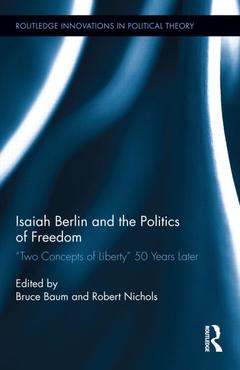Isaiah Berlin and the Politics of Freedom ‘Two Concepts of Liberty’ 50 Years Later Routledge Innovations in Political Theory Series
Coordonnateurs : Baum Bruce, Nichols Robert

Since his death in 1997, Isaiah Berlin?s writings have generated continual interest among scholars and educated readers, especially in regard to his ideas about liberalism, value pluralism, and "positive" and "negative" liberty. Most books on Berlin have examined his general political theory, but this volume uses a contemporary perspective to focus specifically on his ideas about freedom and liberty.
Isaiah Berlin and the Politics of Freedom brings together an integrated collection of essays by noted and emerging political theorists that commemorate in a critical spirit the recent 50th anniversary of Isaiah Berlin?s famous lecture and essay, "Two Concepts of Liberty." The contributors use Berlin?s essay as an occasion to rethink the larger politics of freedom from a twenty-first century standpoint, bringing Berlin?s ideas into conversation with current political problems and perspectives rooted in postcolonial theory, feminist theory, democratic theory, and critical social theory. The editors begin by surveying the influence of Berlin?s essay and the range of debates about freedom that it has inspired. Contributors? chapters then offer various analyses such as competing ways to contextualize Berlin?s essay, how to reconsider Berlin?s ideas in light of struggles over national self-determination, European colonialism, and racism, and how to view Berlin?s controversial distinction between so-called "negative liberty" and "positive liberty."
By relating Berlin?s thinking about freedom to competing contemporary views of the politics of freedom, this book will be significant for both scholars of Berlin as well as people who are interested in larger debates about the meaning and conditions of freedom.
Introduction: Berlin and the Politics of Freedom PartI: Berlin in Context 1. "Two Concepts of Liberty" in Context; James Tully 2.In Defense of Berlin: A Reply to James Tully; George CrowderPart II: Rethinking "Positive" and "Negative" Freedom 3. Defending Isaiah Berlin´s Distinctions between Negative and Positive Freedoms; Maria Dimova-Cookson. 4. Freedom, Autonomy, and Social Selves; John Christman 5. Retrieving Positive Freedom and Why It Matters; Carol C. Gould 6. Republicanism and the Market in "Two Concepts of Liberty"; Eric MacGilvray Part III: Democratic Pluralism and National Self-Determination 7. Berlin and Democracy; Ella Myers 8. Making Sense of Negative Liberty: Berlin’s Antidote to Political Rationalism; Melissa Orlie 9. Berlin, Tagore and the Legitimacy of Nationalism; Partha Chatterjee Part IV: Berlin and Critical Theories of Freedom 10. Berlin, Feminism, and Positive Liberty; Nancy Hirschmann 11. From Rationalism to Micro-power: Freedom and its Enemies; Diana Coole 12. The World of Negative Liberty: Reading Isaiah Berlin through Weak Ontology; Robert Nichols 13. Critical Theory, Ecology, and "What´s Wrong With Negative Liberty"; Bruce Baum
Bruce Baum is Associate Professor of Political Science at the University of British Columbia, Canada.
Robert Nichols is Assistant Professor in the Departments of Philosophy and Political Science at the University of Alberta, Canada.
Date de parution : 12-2012
15.6x23.4 cm
Date de parution : 05-2015
15.6x23.4 cm
Thèmes d’Isaiah Berlin and the Politics of Freedom :
Mots-clés :
Negative Liberty; Political Theory & Philoshophy; Positive Liberty; Isaiah Berlin; Violate; Two Concepts of Liberty; Follow; Freedom; Positive Freedom; Postcolonial Theory; Berlin’s Essay; Feminist Theory; Pagan Self-assertion; Democratic Theory; Berlin’s Account; Critical Social Theory; Free Agency; Berlin’s Argument; Berlin’s Negative Liberty; Berlin’s Analysis; Berlin’s Work; Berlin’s Distinction; Postwar; Hold; Cold War; Negative Freedom; Berlin’s Thinking; Vice Versa; Equal Positive Freedom; Make Sense; Common Language; Rational Monism; Negative And Positive Liberty



